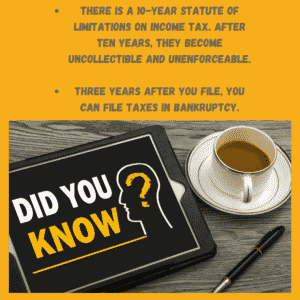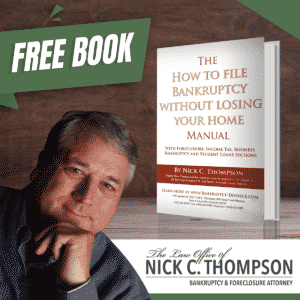Nick Thompson, a tax and bankruptcy lawyer is a former assistant attorney general who worked for the tax department. At that time, he was assigned to prosecute business, trust, and individual tax cases in West Virginia. (Nick’s license is number 51 before the US Tax Court in Washington DC.) What’s even more impressive that Nick has practiced in US Tax Court since 1988 which is a long time for any Louisville, Kentucky tax attorney.
Tax and Bankruptcy Lawyer for Business Trust and Income Tax
Nick studied accounting at Indiana University, operated an accounting section for an oil company, and sat for the CPA exam. Today, he helps people bankrupt their tax debts and has been doing this since 1988. Interestingly, Nick uses bankruptcy as a primary tool to eliminate tax collections. Nick also has the ability to challenge the IRS when other methods are more appropriate. But, bankruptcy is very effective and is the least expensive and more certain method to stop collections.
However, be aware that there are other options that might involve working with attorneys with no tax licensing. Even some tax attorneys such as Roni Deutch and TaxMasters went through sanctions and prosecutions for offering tax options that have little or no chance of working.
Instead of going for the less expensive options, it’s optimal to work with a tax attorney with the appropriate licensing, someone who is a former tax department attorney, and who has extensive bankruptcy experience.
In any case, avoid television tax resolution salesmen who make commissions from the programs they’re selling. They do not have the qualifications to offer tax or legal advice. Moreover, the person on TV might be a criminal with no college whatsoever.
 ⎆ Business, income, trust tax attorney and working with the tax department.
⎆ Business, income, trust tax attorney and working with the tax department.
Additionally, there are many expensive and sometimes ineffective tax defense options that sometimes work and sometimes don’t. However, the tax department often gets abusive and demanding. In fact, sometimes they even demand more than you can pay. They also normally refuse to abate the employer contribution part of a trust tax when bankruptcy can discharge it.
Next, you can submit an offer in compromise to the tax department which only gets approval about 25% of the time. However, an offer in compromise requires you to offer the IRS what is often more than you offer in Bankruptcy court.
However, if you don’t qualify for bankrupting the tax debt or in special circumstances, here is our outline on how to bankrupt tax debts.
The following are some alternatives to filing bankruptcy for taxes:
- You can enter into an installment agreement that may pay less than the interest on the debt.
- 10 years after an assessment you can attempt the statute of limitations.
- Other defenses include the innocent spouse status and currently not collectible status which repays nothing if you can get approval.
- You can also ask for a collection due process hearing, collection appeals program, or offer a lump sum payment.
- You can sue in US Tax Court, pay and sue for a refund in US District Court or ask for penalty abatement.
All these “solutions” for business, income, and trust taxes require you to obtain an agreement with the IRS. But the problem is, those agreements have less than a 50% statistical chance for success. In addition, the tax department and its employees may or may not be reasonable. Often the only successful argument to the IRS is there are no assets or income to take.
⎆ Louisville Kentucky bankruptcy lawyer and taxes.
We are happy to offer these other solutions. But nothing works as quickly, cheaply, or effectively as proper planning and filing bankruptcy. Bankruptcy has the power of a court order from a United States District Court judge and it takes you out of the tax department.
Bankruptcy takes you out of the tax system where the solution you are asking for has to be approved by a person who is paid by the Tax department. If you ask for approval of an offer in compromise you have to be approved by a tax department employee. If you ask for innocent spouse status you are asking a tax department employee to approve it. But you must be aware that the approval comes from an employee who is paid, promoted, and demoted based on their ability to collect taxes. Often asking for mercy in this system is a waste of money and time. In bankruptcy court, we often use judges which are used to granting relief to deserving debtors.
If you are suffering from tax garnishments or liens on your home, bank account or wages call us now for a free appointment about what can be done to stop the tax department collection. Bankruptcy, foreclosure, and tax law have been our primary cases since 1988 when we first went to work for the tax department.
Being nice and doing what the other side wants you to do does not always work in a court of law or in collections. Nick knows how they operate and think. We know what works. Nick knows the law and how they collect. We know what they fear and respect.
Helpful Links for This Article:
 Resources for Bankruptcy
Resources for Bankruptcy
Bankruptcy Filing Time Limitations
Tax and Bankruptcy Lawyer for Business Trust and Income Tax
Chapter 11 Business Bankruptcy Information
File Bankruptcy on Income Taxes
How to Sue the IRS in Bankruptcy Court
If you are thinking about filing bankruptcy, don’t delay because timing is crucial. I am here to help you. So, contact my office right away to start the conversation. Nick C. Thompson, Bankruptcy Lawyer: 502-625-0905.




